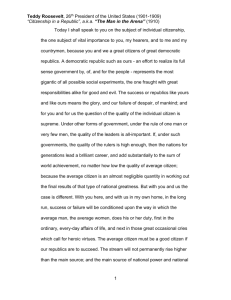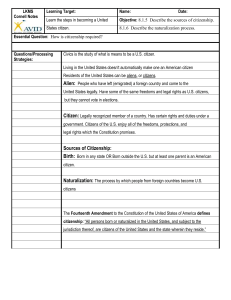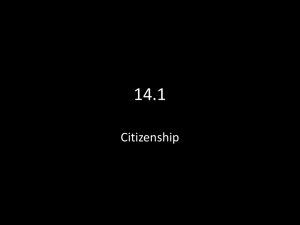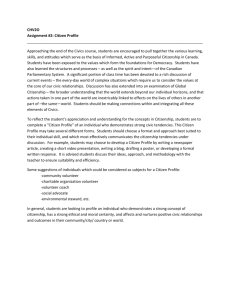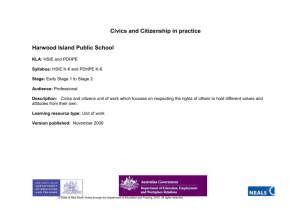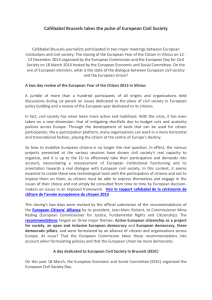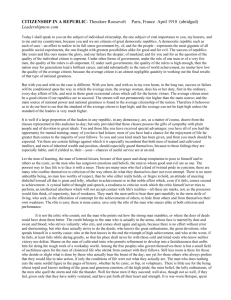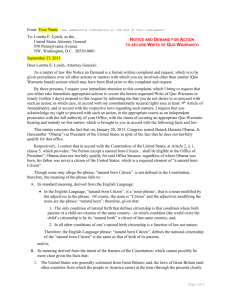Creating Global Public Goods
advertisement
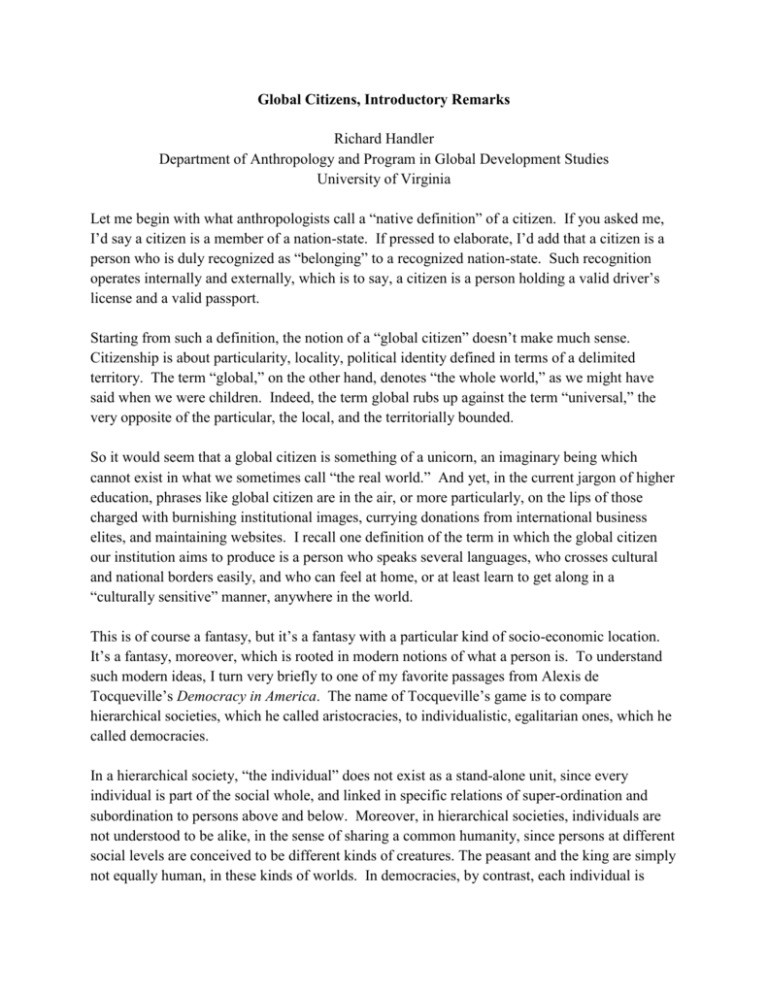
Global Citizens, Introductory Remarks Richard Handler Department of Anthropology and Program in Global Development Studies University of Virginia Let me begin with what anthropologists call a “native definition” of a citizen. If you asked me, I’d say a citizen is a member of a nation-state. If pressed to elaborate, I’d add that a citizen is a person who is duly recognized as “belonging” to a recognized nation-state. Such recognition operates internally and externally, which is to say, a citizen is a person holding a valid driver’s license and a valid passport. Starting from such a definition, the notion of a “global citizen” doesn’t make much sense. Citizenship is about particularity, locality, political identity defined in terms of a delimited territory. The term “global,” on the other hand, denotes “the whole world,” as we might have said when we were children. Indeed, the term global rubs up against the term “universal,” the very opposite of the particular, the local, and the territorially bounded. So it would seem that a global citizen is something of a unicorn, an imaginary being which cannot exist in what we sometimes call “the real world.” And yet, in the current jargon of higher education, phrases like global citizen are in the air, or more particularly, on the lips of those charged with burnishing institutional images, currying donations from international business elites, and maintaining websites. I recall one definition of the term in which the global citizen our institution aims to produce is a person who speaks several languages, who crosses cultural and national borders easily, and who can feel at home, or at least learn to get along in a “culturally sensitive” manner, anywhere in the world. This is of course a fantasy, but it’s a fantasy with a particular kind of socio-economic location. It’s a fantasy, moreover, which is rooted in modern notions of what a person is. To understand such modern ideas, I turn very briefly to one of my favorite passages from Alexis de Tocqueville’s Democracy in America. The name of Tocqueville’s game is to compare hierarchical societies, which he called aristocracies, to individualistic, egalitarian ones, which he called democracies. In a hierarchical society, “the individual” does not exist as a stand-alone unit, since every individual is part of the social whole, and linked in specific relations of super-ordination and subordination to persons above and below. Moreover, in hierarchical societies, individuals are not understood to be alike, in the sense of sharing a common humanity, since persons at different social levels are conceived to be different kinds of creatures. The peasant and the king are simply not equally human, in these kinds of worlds. In democracies, by contrast, each individual is understood to be a center of autonomous agency, equal in principle to all other individuals, and in fundamental respects like those others, since all are equally human. As we say in the United States, anyone can grow up to be president. We know, of course, where our preference lies, since all of us who were educated in the school systems of a democracy know that hierarchy and inherited status are backwards and bad, whereas freedom and equality are modern and good. But Tocqueville was able to see the strengths and weaknesses of both systems, by juxtaposing one against the other; and the following comparative observation is particularly apt for our consideration of the idea of global citizenship. In aristocracies, according to Tocqueville, people are linked tightly to those above and below; that is, they are “almost always closely attached to something placed out of their own sphere.” As a consequence, “they are often disposed to forget themselves,” because the self, in this world, is not the primary reality. Democratic societies, on the other hand, are atomistic: equivalent individuals live side by side without much social connection one to the other, but they believe that all people everywhere are alike. The contrast between these social formations plays out strikingly in attitudes toward global citizenship; in Tocqueville’s words: In [aristocratic] ages the notion of human fellowship is faint and … men seldom think of sacrificing themselves for mankind; but they often sacrifice themselves for other men. In democratic times, on the contrary, when the duties of each individual to the race are much clearer, devoted service to any one man becomes rarer; the bond of human affection is extended, but it is relaxed. [volume II, book 2, chapter 2, “Of Individualism in Democratic Countries”] To me, this passage describes one version of global citizenship that is quite common in the United States and quite visible on college campuses. We are ready to pitch in to help people faraway, usually by anonymously giving money (that universal medium of exchange) through a bureaucratic organization to people we will never know; but if you watch us walk our own city streets, skirting with embarrassment and furtive looks the beggars on our own sidewalks, you will see that we avoid like the plague personal connections to people who need our help. We’ll engage in a bizarre ritual, like biking for Uganda, to demonstrate our common humanity, but we have no interest in making common cause, in a socially sustained and continuous way, with particular poor people in our own communities who might need our help and some of our resources. And to generalize from this example: the modern idea of the generic human being, or of “all mankind” to whom we are connected in good faith, is a peculiar one. It is not obviously the case that any one of us should be able to go anywhere in the world and relate instantly to other people, simply on the grounds that we’re all human. After all, what makes us human, anthropologists teach, is precisely what makes us differ from other people: our particular histories and cultures. And even if we have what we think are “cultural skills,” it’s a fantasy to think we can make deep, or meaningful, or even practicable social connections to other people in an instant; it usually takes a while to become a part of someone else’s community, and even more time if we wish to know how to work with them to help them achieve goals they themselves think are important. Finally, the idea of the global citizen is not only fictional in its implications of a kind of instant rapport. It is deeply deluded (self-mystified, we might say) in its inattention to the privileged social position of those who aspire to be global citizens. When universities, for example, talk about producing multi-lingual global citizens who can cross all cultural boundaries, they forget that such imagery presupposes the existence of the benighted natives who, too poor to travel, stay home, where they can nonetheless live as culturally “authentic” monolingual locals whom we visit and connect to, as we choose. Global citizenship is really about the assumed rights of socio-economically privileged white people to travel anywhere in the world they wish, to visit and/or to “help” darker-skinned people. After all, in American popular discourse, are “illegal Mexican immigrants” global citizens?

